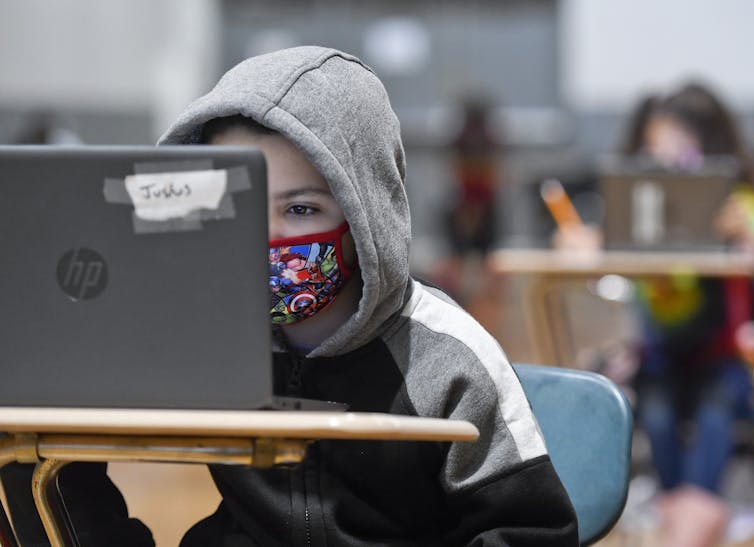5 simple tips for parents who will still be co-teachers when kids go back to school
- Written by Lorrie Webb, Department Chair and Professor of Curriculum & Instruction, Texas A&M-San Antonio
COVID-19 undoubtedly changed K-12 classrooms for the near future.
When school resumes in the fall, even if education returns to pre-pandemic “normal” – with students attending classes all day and in person – teachers are likely to use more online tools and virtual resources[1] than they did pre-COVID. The push into remote learning due to the pandemic opened up resources and opportunities[2] that many schools might not have used before the pandemic. This has led to rethinking the K-12 education system[3] as a whole and how online learning can continue both when students are in school or studying at home.
That means parents need to be prepared to continue the role of facilitator of learning and technology specialist for their school-aged children.
A daunting challenge continues
The pandemic exposed deep inequities in our society – not just in health issues[4] but in everything from which families could afford child care[5] to how easily schools could transition to remote learning[6]. But any parent may feel daunted by the prospect of managing their child’s or children’s remote learning.
One’s education degree does not always matter, nor their level of education. For example, a second-grade teacher might struggle in the role of instructional aide for their teenage child taking physics. Likewise, a high school teacher might be unable to break down the basics of teaching reading to their own kindergartner learning at home. Parents with high school diplomas or less may do just as well assisting their kids with schoolwork as those with a law or medical degree.
Furthermore, consider parents who had three children at home in three different grade levels – or even three different schools. Some juggled three different teachers working in different formats, learning platforms and time schedules.
As teacher[7] educators[8] who are reevaluating how to prepare teachers for future learning disruptions, we’d like to offer parents and caregivers some tips for the upcoming back-to-school season.
1. Get to know the teacher
Your child’s teacher may be unaware of your concerns, so don’t be afraid to ask questions. For example, if your child remains in virtual learning full- or part-time, you may want to ask the teacher about meeting times; whether video and audio should be on at all times; and how to use the learning platform to submit work or ask questions. Parents could meet with their child’s teacher – virtually or in person. Fostering a positive working relationship with your child’s teacher can improve academic performance[9].
Consider the day-to-day changes that your child will experience upon returning to the classroom. For example, children will begin to work in collaborative group settings and may be required to resolve conflicts with peers[10]. The small changes may affect your child’s transition, so it is beneficial to check in with the teacher regularly.
2. Embrace technology
Even children new to a specific learning platform are likely to be digital natives[11] who can figure out how to use the newly introduced technology on their own.
 Kids can use different learning websites and apps to reinforce what they learn in school.
Ben Hasty/MediaNews Group/Reading Eagle via Getty Images[12]
Kids can use different learning websites and apps to reinforce what they learn in school.
Ben Hasty/MediaNews Group/Reading Eagle via Getty Images[12]
Allow your child the opportunity to explore different learning websites and apps, either ones recommended by the teacher or ones that adhere to expectations determined by you. These might include active read-aloud activities, educational games and virtual field trips.
Even if your child is not in a virtual learning environment, online learning tools can help reinforce topics taught in class[13] and provide additional help for a child struggling with a specific lesson or topic.
3. Keep expectations high
Encourage your child to complete homework, assigned activities and reading. This requires affirming their knowledge and ability to do the work on their own. Routines are critical[14] during this transition period coming out of the pandemic, but foster your child’s independence through flexibility in those routines. Remember that some good came out of the pandemic, as families were reminded to slow down[15] and readjust as needed[16].
4. Focus on your own strengths
Learning occurs in all aspects of our day-to-day lives. As a parent-turned-teacher, consider everyday tasks such as cooking, household chores and managing finances to be true learning experiences for your child. Discuss with your children your own transition from pre-pandemic to post-pandemic in terms of technology use, work habits and stress, among other things.
5. Encourage reading
Provide at least 30 minutes a day for your child to read books of their choice. All children, no matter their age, should be encouraged to read daily to increase their literacy[17].
If your child continues to attend class virtually, library books may not be as readily available. In that case, try e-books – with and without read-aloud components. Also consider assisting your children in using the internet to research types of books they may want to read.
[Get facts about coronavirus and the latest research. Sign up for The Conversation’s newsletter.[18]]
References
- ^ more online tools and virtual resources (www.rand.org)
- ^ opened up resources and opportunities (www.doi.org)
- ^ rethinking the K-12 education system (www.nature.com)
- ^ health issues (www.nature.com)
- ^ afford child care (www.un-ilibrary.org)
- ^ transition to remote learning (doi.org)
- ^ teacher (apps.tamusa.edu)
- ^ educators (scholar.google.com)
- ^ can improve academic performance (doi.org)
- ^ resolve conflicts with peers (theconversation.com)
- ^ digital natives (doi.org)
- ^ Ben Hasty/MediaNews Group/Reading Eagle via Getty Images (www.gettyimages.com)
- ^ reinforce topics taught in class (doi.org)
- ^ Routines are critical (eclkc.ohs.acf.hhs.gov)
- ^ families were reminded to slow down (www.wsj.com)
- ^ readjust as needed (www.doi.org)
- ^ increase their literacy (www.doi.org)
- ^ Sign up for The Conversation’s newsletter. (theconversation.com)

















